|
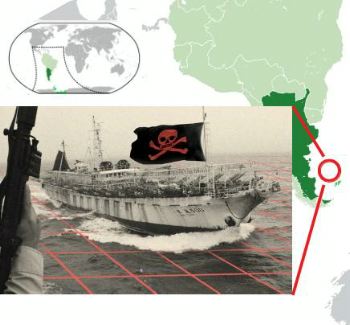
intervention: Pablo Domrose /FIS
Pirate fishing: 400 foreign ships hiding off Chubut perform illegal fishing
 ARGENTINA
ARGENTINA
Wednesday, March 13, 2019, 00:00 (GMT + 9)
The latest persecution was a year ago: a Coast Guard from the Argentine Naval Prefecture followed a Chinese boat that was illegally fishing at the San Jorge Gulf. The ship managed to escape, but had to pay a fine. A month before, a Spanish ship did the same but was seized and had to pay a fine of USD 7.5 million.
What happened last year with those two boats was an exception. Because most of the 400 foreign ships that fish without any control do so a little beyond the 200 miles, about 321 kilometres from Comodoro Rivadavia, where Argentina can do nothing because it is no longer the Argentine Sea. In this note we tell you how this fleet operates, what countries it is from, what species it destroys, how it affects the national production, where it unloads the fishing and how many sailors died during a cruel practice that worries the UN.
On January 16, conservationist Milko Schvartzman counted at least 300 fishing boats between the 42nd and 46th parallel, off the coast of Chubut, but beyond mile 200, where the waters are international. He did not have to fly over the area. It simply entered a platform where most of the ships are located in real time in a satellite way.
"They are pirate ships because nobody controls what they fish and how they fish. They hide behind mile 200, where international legislation does not regulate the exploitation of fishery resources," says Schvartzman, who leads the Oceanosanos project, based in Montevideo and funded by Leonardo Di Caprio Foundation.
It is not necessary to simply believe him. It is better to look at this satellite capture and see how the ships pile up in front of Chubut, but behind the red line that marks the end of the Argentine Sea, where the Prefecture has the power to watch that no one fishes without permission.
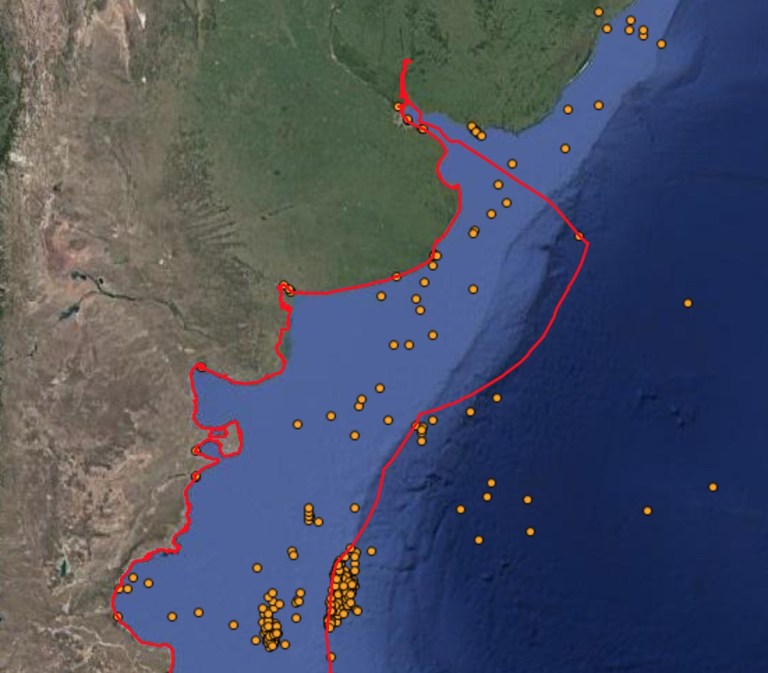
Each yellow circle represents a fishing boat. Source: Oceanosanos
They sweep away the squid
Most of the boats are Chinese, around 40 per cent. The rest are from South Korea, Taiwan and Spain. About half of them look for squid.
"By year, they fish between 200,000 and 1 million tonnes. Preferably, they capture squid, but also hake, Patagonian toothfish and cod," says Eduardo Pucci, director of the Organization for the Protection of Natural Resources of the South West Atlantic (OPRAS), a local NGO that has the support of the national fisheries sector.
For Oceanosanos, that "pirate" fishing bills at least USD 800 million per year. For OPRAS, it does not fall below USD 3,000 million, USD 1,000 million more than what represents all the Argentine fishing exports.
Devastating a naturally rich area
The satellite images are too eloquent. All boats in the same sector. And that has an explanation. That area, which is partly known as Blue Hole, is really particular and rich in resources.
"The particular thing is that the continental shelf extends a bit beyond mile 200. Just a few miles further in, the slope begins. There, between the platform and the slope, there is a huge migration of squid. And the boats exploit the benefit of that happening just outside the exclusive economic zone of Argentina," explains marine biologist Claudio Campagna, director of the Forum for the Conservation of the Patagonian Sea, made up of 16 NGOs, including Fundación Vida Silvestre, Aves Argentinas and FARN.
Environmental damage and marine biodiversity is difficult to measure because there are no records of what is caught. "What we can say is that the damage exists, absolutely. It is a damage on the abundance of species and on diversity," says Campagna.
Milko, from Oceanosanos, adds that the squid is at the centre of the marine food chain: "If you attack the species on which a large part of the other fish depends, you attack the entire ecosystem."
For Javier García Espil, National Director of Environmental Management of Water and Aquatic Ecosystems, any unregulated activity has an impact. "Within the Argentine Sea we work in responsible fishing practices, to avoid, for example, incidental (accidental) fishing. We also study the biomass and how the fish population fluctuates to avoid depleting the stock of fish. That is why catch quotas are granted," Espil says.
All this is what does not happen after mile 201. Many boats fish with trawls and accidentally kill albatrosses or catch fish that they later discard because they have no commercial value.
"Everything that happens in these international waters impacts the Argentinean Sea because the species are migratory, they go from one place to another, like whales, killer whales, elephant seals, sharks, rays and squid," points out García Espil.
That is why Pucci, from OPRAS, talks about an economic loss of about USD 500 million for the fleet of 600 Argentine fishing vessels.
State subsidies for boats totalling 53 deaths
For the activity to be profitable, the foreign fishing fleet resorts to several practices that are internationally condemned by the United Nations Food and Agriculture Organization (FAO) and the World Trade Organization.
Many of the boats that fish on the high seas, far from their ports of origin, manage to be profitable thanks to subsidies they receive from their states. Researchers from the National Geographic Society, the University of California at Santa Barbara, Global Fishing Watch, the Sea Around Us project, the University of British Columbia and the University of Western Australia, all came to this conclusion. Together they studied fishing on the high seas.
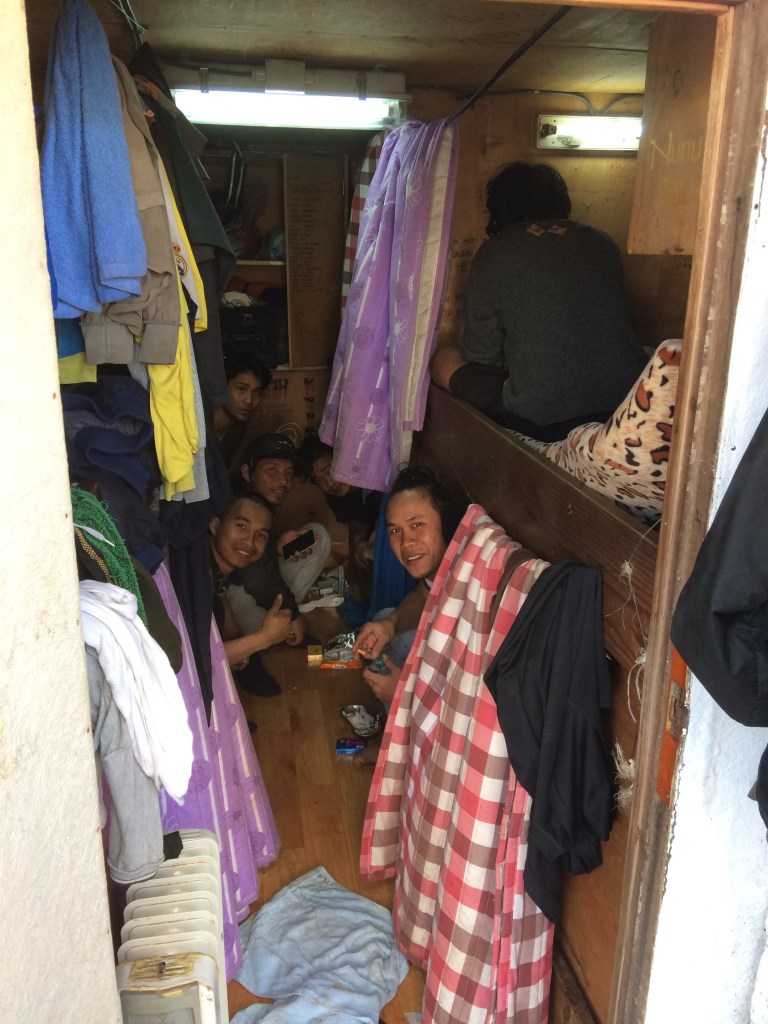
Indonesian crewmen on a Korean ship. Credit: Oceanosanos
"To this we must add the slave work. Each ship has between 35 and 40 crew. The top five are from the flag country, but the rest are usually from the Philippines, Indonesia or from African countries. And they work in conditions on board that are usually terrible. We have seen in the port of Montevideo crew members of a Chinese ship that had marks of shackles on their ankles," denounces Milko.
Moreover, the Navy of Uruguay, before a request for a report made by the Organization for the Conservation of Cetaceans, had to detail the incidents registered in the port of Montevideo linked to the crew of the foreign ships that dock there.
The response of the National Naval Prefecture of that country includes a chilling fact: from 2013 until March 2018, foreign fishing vessels dropped 53 dead people. Almost one per month:
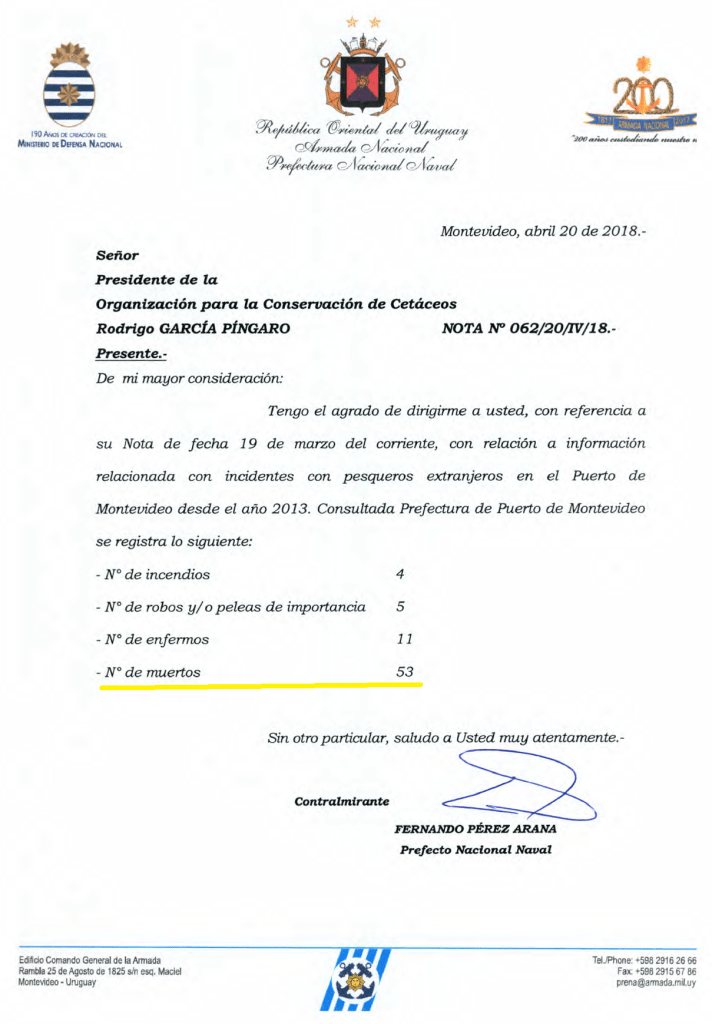
The triangulation via Montevideo
One of the main measures taken by Argentina to discourage poaching on the high seas was to prohibit it from entering local ports. "Our country does not allow the entry of foreign vessels that operate on the high seas to national ports," they remarked in writing, and given the consultation made by RED/ACCIÓN, from the Undersecretariat of Fisheries of the Nation, which is headed by Juan Bosch.
In the same note, the Undersecretary stresses that "illegal, unreported and unregulated fishing ... may even lead to the total collapse of a fishery or severely prejudice efforts to restore depleted stocks."
Brazil and Chile made the same decision as Argentina and closed its ports. But it was not enough because Uruguay, via Montevideo, receives part of the fishing that the boats carry out in front of Chubut.
In an official statement released on the site of the Presidency of Uruguay, the National Directorate of Aquatic Resources announces a series of efforts to control fishing vessels entering Montevideo but recognizes that during 2015 there were more than 1,500 landings and notes that "more than half were from ships that were transshipped on the high seas", which is understood as a "risk situation that can cover illegal fishing".
“What happens is that reefers or freezing vessels board the fishing boats on the high seas and carry the catch of up to 15 fishing boats," explains Milko and continues: "Before entering Montevideo with the cargo, Uruguay requires the captain to report what the vessel is taking, where it was captured, from what ships it comes. Finally, that freezer ship arrives at the port, makes the unloading, uploads it to a container and that container travels on a freighter to Asia, Europe or wherever. But nobody observes if it is true or not what the captain said they were carrying. In addition, the reefer has mixed the cargo of 15 ships."
Milko assures that the boats choose Montevideo because there are few controls and because of a cost issue, since "in that port they do not pay VAT and in addition the catch does not pay import and export taxes because it is a free zone".
During an interview published in November by Revista Puerto, the president of the National Ports Administration of Uruguay, Alberto Díaz Acosta, assured that in the port of Montevideo a "physical control" is carried out on the ships, although he recognized certain weaknesses: "I do not know if the method of control is random or by complaint."
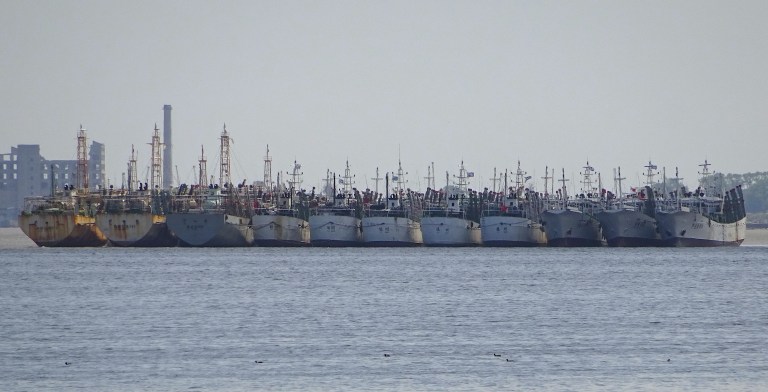
Chineses jiggers in Montevideo port
Possible solutions and the Falkland Islands (Malvinas) issue
The United Nations Convention on the Law of the Sea, of 1982, is a multilateral treaty to which Argentina adhered, and it is the norm that attempts to organize the activity at sea.
Among other issues, this agreement provides limits to maritime zones; the exclusive economic zones of each country; the continental shelf and the high seas. It also legislates on navigation rights. But it is really unclear about the exploitation of resources in international waters
"However, that convention says that States must cooperate in taking measures for the conservation of living resources of the high seas. And that is a point which Argentina could grab to work out a solution," said Rucci, from OPRAS.
For Claudio Campagna, the fact that in the zone where foreign vessels fish without control there are transzonal species, is an element to "exercise sovereignty".
For Milko, of Oceanosanos, there are several legal tools that Argentina has: "In the Sustainable Development Goals of the United Nations there is one dedicated to marine life". That point calls "by 2020, to effectively regulate fishing exploitation and stop overfishing, illegal, unreported and unregulated fishing and destructive fishing practices."
Milko points out that one could also resort to the World Trade Organization to denounce subsidies to this type of fishing and to the International Labour Organization for the conditions under which the crew works.
"What other states do is to work with the countries of the region to restrict the access of this predatory fleet with some type of agreement that achieves recognition from the UN, such as the Commission for the Conservation of Antarctic Marine Living Resources, which managed to order fishing in that area," exemplifies Milko.
In the need to reach a regional agreement many of the actors interested in the subject agree, but there is a latent risk that until now no government has been willing to run: "If you wanted to reach an agreement with the coastal countries of the South Atlantic, it could be indirectly recognizing the Falklands Islands (Malvinas) as a coastal state," warns Pucci.
In the Foreign Ministry of Argentina they preferred not to make any kind of statements on the subject. While the Undersecretariat of Fisheries limited itself to saying: "Argentina will continue working jointly at the international level, while at the regional level it is part of the network of exchange of information and experiences among countries of Latin America and the Caribbean to prevent, discourage and eliminate illegal, unreported and unregulated fishing."

Argentinean Coast Guard (PNA)
The efforts made by Prefecture and the invisible line
Carlos Villarreal has worked in Prefecture for 32 year. For some years now, he has been the Head of the Maritime Traffic Service and one of the main people in charge of guarding the 200 mile of the Argentine Sea.
"Now, looking at the monitoring equipment we have, I can tell you that there are about 200 ships on the 46th parallel, at the height of Comodoro Rivadavia, but between the 201 and 210," he says by telephone.
Villarreal says they have a Coast Guard almost 24 hours a day, 365 days a year, and up to two, patrolling that area. "But they do not enter the Argentine Sea, so we can not do anything," he explains.
Sometimes, very occasionally, they enter. "We detect them, because we have the coastguard in the area, because since 2014 we have had a Beechcraft 350 plane destined for this work and because we have a satellite control system," says Villarreal.
From 1983 until today, 75 vessels have been captured by Prefecture fishing illegally in the Argentine Sea. A lot. Or few, if you consider that a few miles offshore, outside the exclusive economic zone of Argentina, up to 400 boats fish what they want and how they want without any control.
Author: .jpg)
editorial@seafood.media
www.seafood.media
|



